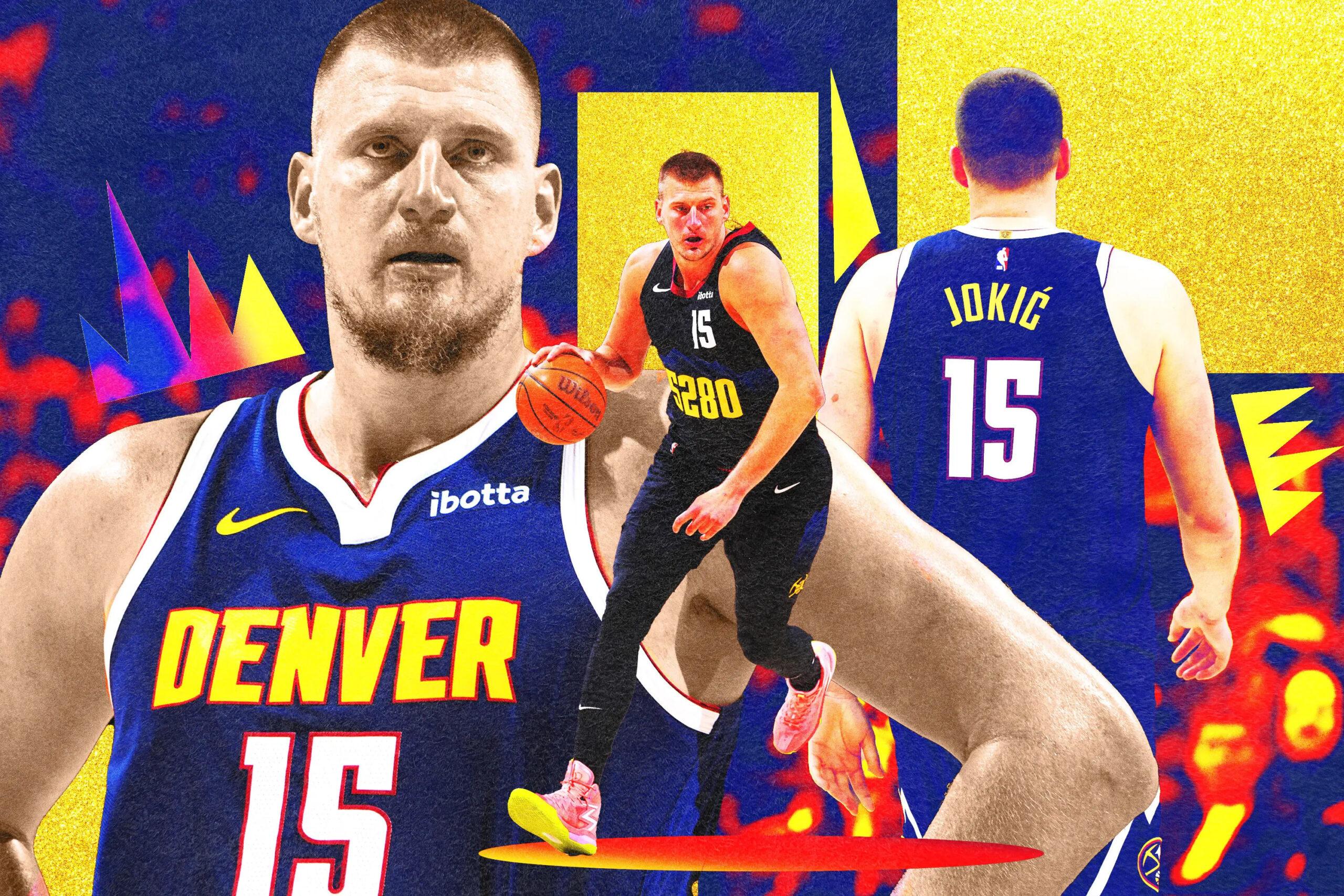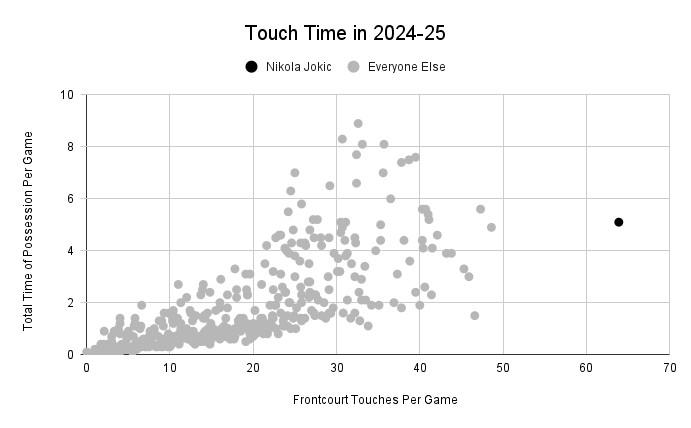Nikola Jokic Was Already the Best Basketball Player Alive. Somehow, He’s Even Better Now.
The Denver Nuggets star is leading the NBA in rebounds and assists per game—and he’s not far off the pace in scoring. Is the three-time MVP somehow making another leap? And is it a bad sign that the Nuggets need him to?
Nikola Jokic is already one of the most accomplished players in NBA history. He’s a three-time MVP—one of just nine players to win so many. He’s the single-season record holder in player efficiency rating and the career record holder in PER and box plus-minus. He is, in the greatest honor of all, the unanimous no. 1 player in The Ringer’s Top 100 ranking for the second year in a row.
So it’s really saying something that Jokic’s start to the 2024-25 season represents the best stretch of his regular-season career. Don’t just take my word for it; the numbers say so. According to game score—an all-in-one metric designed to capture a player’s overall production—Jokic is somehow one-upping himself. The following chart shows the best non-overlapping 10-game stretches of Jokic’s career; his start to this season ranks second, behind only a 10-game span—from Game 4 of the first round through Game 2 of the conference finals—during his run to a championship in the 2022-23 postseason.
Best 10-Game Stretches of Nikola Jokic’s Career
Jokic has six triple-doubles in 10 contests, the past five all wins for a Nuggets team that scuffled out of the gate. His career-best 29.7 points per game rank fifth in the league. His 13.7 rebounds rank first. And his 11.7 assists rank first, too. He’s already an NBA legend, and now his numbers look better than ever.

No player in NBA history has led the league in both assists per game and rebounds per game in separate seasons, let alone the same season. (Wilt Chamberlain was an 11-time rebounding champion and led the league in total assists in 1967-68, but he placed second to Oscar Robertson in assists per game.) Only seven previous times has a player finished in the top five in both statistical categories in the same season—twice from Jokic and five times from Hall of Famers more than half a century ago.
Top Five in Both Rebounds and Assists per Game
Even the two players who have averaged a triple-double over a full season didn’t lead the league in both categories. Russell Westbrook never finished higher than sixth in rebounds per game, while Robertson, in a higher-rebound era, never placed better than ninth.
The early 2024-25 results suggest that Jokic, who has always seemed like a dominant scorer by happenstance rather than intent, has an outside chance at this season’s scoring title, too. He’s just 1.5 points per game off of leader Anthony Davis, with more 40-point games (two) than sub-20-point efforts (one). There’s a nonzero chance that Jokic will invent the NBA triple crown this season.
And, for good measure, Jokic is also averaging career highs in steals (1.7) and blocks (1.0) per game. He’s stuffing the stat sheet about as much as realistically possible outside a Jon Bois experiment to break NBA 2K.
A few factors contribute to this statistical surge. Jokic’s rebounds have spiked mainly on the offensive end, as he’s inhaling 4.5 offensive boards per game. This shift means Jokic’s league-leading rebounding total is even more valuable than it first appears: Across the league, second-chance plays are more fruitful (1.14 points per possession, according to Cleaning the Glass) than regular half-court ones (0.96).
And Jokic has boosted his points and assists because he’s handling the ball more than ever before. Jokic led the NBA in touches in the frontcourt in each of the past six seasons, according to tracking data, but by only a small margin each year. This season, however, the gap between Jokic and second-place Jayson Tatum is larger than the gap between Tatum and 41st place. Look at how lonely Jokic’s dot is on this chart.

Note that this isn’t just because Jamal Murray missed a few games during a stint in the NBA concussion protocol. Jokic actually has more points and assists per 100 possessions when playing with Murray this season than he does without him, per PBP Stats.
Alas, here is the moment when every article analyzing an early-season trend hits a speed bump: The season is just 10 games old, and Jokic’s numbers will probably regress as it continues.
One reason to expect regression is that Jokic’s current assist rate is inflated by aberrantly hot shooting from his passing targets. According to an analysis of NBA Advanced Stats data, Jokic’s teammates are making 43 percent of their 3-pointers off his passes this season. But that figure was between 35 and 38 percent in every other season since he was a rookie.
His own 3-point shooting will return to normal as well. Not even a savant with Jokic’s touch will make anywhere close to 56 percent of his 3s over a full season, as he has thus far. Still, it is an encouraging sign that Jokic’s shot has rebounded after it repeatedly misfired during the 2023-24 playoffs (26 percent) and Olympics (17 percent).
And Jokic can compensate for a 3-point decline—because even as he starts missing more 3-pointers, he will probably start making more 2s. So far this season, his rim accuracy is at its lowest rate since he was a rookie, and his midrange accuracy is at its lowest in six years, per CtG.

But we’ve saved the main reason to expect regression for last. Because there’s another Jokic stat that’s also at a career high, and it’s the one worrying number in this entire piece:

Jokic is averaging 38.2 minutes per game, which is the second-highest figure in any 10-game span of his regular-season career. Outside the playoffs, the only other stretch in which Jokic played more was the 10-game sprint to close the 2017-18 regular season, when Denver nearly surged into the playoffs but fell short in overtime against Minnesota in Game 82. Given that many of those games were de facto elimination contests, the start to the 2024-25 season represents the most Jokic has ever played in a “normal” period.
Denver is leaning so heavily on Jokic partially because the roster is shorthanded (due to both departures and injuries) and partially because it’s already played two overtime games after going to OT just once last season. Seven of Denver’s 10 games have remained close until the end, meaning no garbage time to rest its stars. His team has needed all those minutes and all that production; the Nuggets are 7-3, but—with two overtime wins and three regulation wins by two points apiece—they’re just a few plays away from 2-8 and the worst record in the West.
This huge workload is a particular concern as Jokic comes off an abbreviated summer break due to his Olympic competition. Jokic is one of the best playoff performers in NBA history, but the Nuggets can’t wear him down before April. Only three players are averaging more minutes than Jokic this season, and two of them (Tyrese Maxey and Kevin Durant) are already injured.
If Jokic drops from 38 to 35 minutes per game—his previous high—the rest of the way, Denver probably won’t maintain a top seed in the Western Conference given how much it depends on him to power its victories. The Nuggets’ team-building strategy has thrust even more responsibility onto their leader. Once again, his on/off numbers are laughably absurd—per CtG, the Nuggets’ net rating drops by 43.7 points when Jokic sits, which is by far the largest margin in the league.
On an individual level, if Jokic cuts back on some playing time to remain fresh through the spring, he probably won’t end up leading the league in both rebounds and assists. But even that possibility wouldn’t diminish his performance; on a per-possession basis, his current offensive box plus-minus score is blowing away the all-time record, set by Steph Curry in his unanimous MVP season, and Jokic is on pace to shatter his own single-season PER record. Jokic should be favored to win his fourth MVP award, an accomplishment restricted to Kareem Abdul-Jabbar, Bill Russell, Michael Jordan, Wilt Chamberlain, and LeBron James.
That’s a list of arguably the five best players in NBA history. Jokic is now 10 games closer to joining them after the hottest start of his celebrated career.


